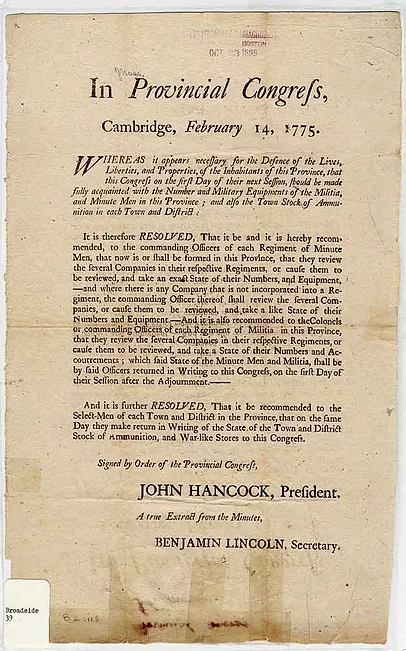The Massachusetts Provincial Congress was a revolutionary governing body that played a crucial role in the lead-up to the American Revolution. Formed in response to escalating tensions with Great Britain, it served as a de facto government for the colony, exercising powers that had traditionally belonged to the British-appointed governor.
On October 5, 1774, over ninety representatives from the various Massachusetts county conventions met in Salem in defiance of General Thomas Gage’s dissolution of the Massachusetts Colonial Legislature. Upon learning of the meeting, Gage attempted to shut down the meeting but failed. Acting upon the advice of the various county conventions and resolves, especially the Suffolk Resolves, the representatives quickly voted to organize themselves into a “Provincial Congress…to take into consideration the dangerous and alarming situation of public affairs in this province, and to consult and determine on such measures as they shall judge will tend to promote the true interest of his majesty, and the peace, welfare, and prosperity of the province.”1 The representatives remained in Salem for a few days and then quickly adjourned to reconvene in Concord, Massachusetts.
The Provincial Congress quickly became the center of resistance to British rule, assuming responsibilities previously belonging to the Royal Governor. The Congress also took decisive action to prepare for the possibility of armed conflict. It organized and equipped militias, established committees of safety to maintain order and suppress Loyalist activity, and oversaw the collection of supplies and provisions for the impending struggle. The Congress also played a vital role in communicating with other colonies, fostering intercolonial cooperation, and coordinating resistance efforts.
One of the Massachusetts Provincial Congress’ more notable actions was calling for the formation of companies that “shall equip and hold themselves in readiness, on the shortest notice.”2 In response, many towns raised and equipped special volunteer companies, known as minutemen, that would train at least twice weekly and be ready to answer an alarm at a minute’s notice.
By the end of 1774, the Congress’ Committee of Safety began procuring supplies in case of a conflict with the British forces garrisoned in Boston. Supply depots were established in places like Concord and Worcester. Over the winter of 1774 and 1775, the Provincial Congress moved closer to organizing a standing provincial army. By February, the Congress instructed the Committee of Supplies to purchase “all kinds of warlike stores, sufficient for an army of fifteen thousand men to take the field.”3 In case of a sudden move by the British Army to seize the military supplies, the Committee of Safety established a network of observers to keep watch on the British and carry the alarm into the countryside, particularly to the principal magazines such as Concord and Worcester. By early April 1775, Congress adopted Rules and Regulations for a proposed Massachusetts Army.4
The establishment of the Massachusetts Provincial Congress was essentially a coup d’état: a sudden and unlawful seizure of power. The royal government, headed by General Gage, was now isolated and virtually powerless except in Boston, where the British Army and Navy were able to enforce his orders. In the Massachusetts countryside, colonists inched closer to war.
Notes:
1 Massachusetts Provincial Congress, (Salem: October 7, 1774); “Warlike Preparations,” National Parks Service, accessed January 20, 2025, https://www.nps.gov/mima/organization.htm.
2 Ibid.
3 Massachusetts Provincial Congress, (Cambridge: February 14, 1775); “Warlike Preparations,” National Parks Service, accessed January 20, 2025, https://www.nps.gov/mima/organization.htm.
4 Ibid.


